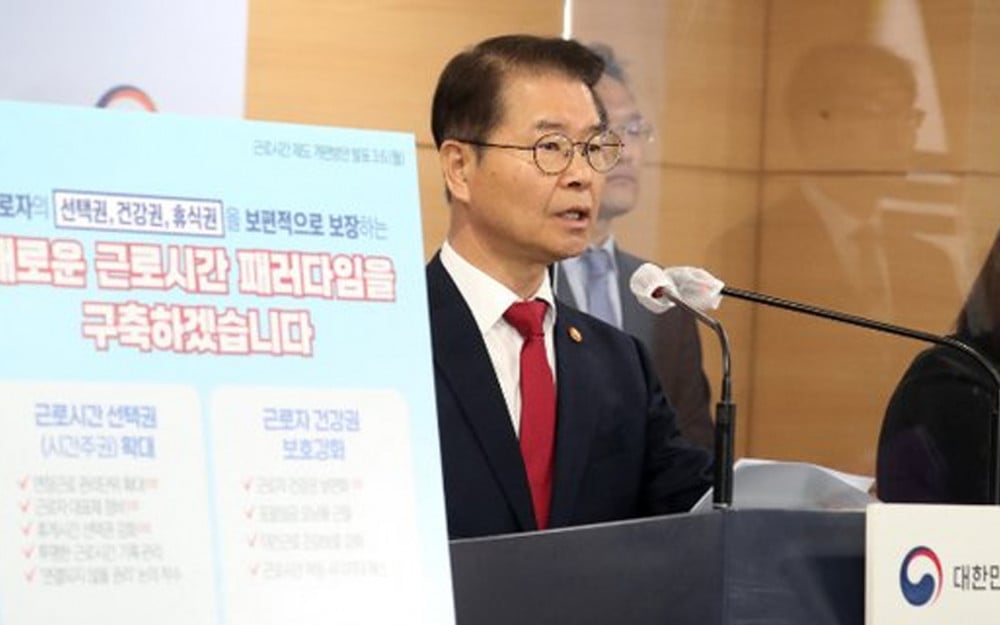
The South Korean government is poised to reinitiate discussions on the controversial '69-hour workweek' policy, a crucial revision to working hours, drawing insights from a survey conducted. The policy proposes a modification to increase the limit of permissible working hours in a week, elevating it from the existing threshold of 52 hours to a new cap of 69 hours per week. In an effort to align the policy with public sentiment, the government is meticulously proceeding towards legislation, particularly mindful of the substantial criticism surrounding the endorsement of prolonged working hours.
Set to be disclosed are the findings from an extensive two-month survey, encompassing the viewpoints of approximately 6,000 citizens starting in June. This survey scrutinized the current working hours system, seeking to unearth its shortcomings while actively soliciting feedback from the general public and the workforce. The government is committed to leveraging these insights as a foundational element for the impending policy adjustments. Following the release of the survey results and the recommended modifications to the working hours system, it is anticipated that significant and meaningful revisions will be implemented.
The government had previously finalized the 'working hours system revision plan' in March and planned to announce legislation by April 17. The core of the plan was to change the management of extended working hours from a weekly basis to monthly, quarterly, semi-annually, and annually. The aim was to introduce flexible working hours that allow for more work when times are more busy and less work when it's not. The Ministry of Employment and Labor explained that the existing system restricts the choices of both businesses and workers and fails to accommodate the diverse demands of labor and management.
The proposed increase in the maximum allowable working hours to 69 per week immediately met with vehement opposition upon its public disclosure. Critics highlight that, under this plan, once the guaranteed "11 consecutive hours of rest until the next working day post-departure" are accounted for, only 13 hours remain in a day. After further deducting the mandated rest breaks as per labor standards, which amount to 1 hour and 30 minutes for every 4 hours worked, an individual could potentially work up to 11 hours and 30 minutes each day. Cumulatively, across a 6-day work week (excluding a single day off), this equates to a staggering 69 hours of labor, sparking concerns and backlash. After the plan was unveiled, the Korean Confederation of Trade Unions (KCTU) criticized it, saying, "It benefits only employers and disregards the health of the employees," while the Federation of Korean Trade Unions (FKTU) stated that it was "tantamount to allowing employees to be worked until the brink of death." Public opinion also leaned towards the opinion that the working hours were excessively long.
In response to the opposition, President Yoon Seok Yeol instructed to improve the revision plan. He urged to consider various opinions of workers, especially the MZ generation (born in the 1980s and early 2000s), and make adjustments regarding the content of the legislation and communication with the public. The Ministry of Employment and Labor stated that many voices of concern about the potential misuse of the system had been raised and that they would seek improvement measures.
If the revised working hours plan is pursued in the same way as before, it is expected to face renewed public backlash. To overcome this, it is suggested that the maximum working hours per week should be reduced, as this is crucial to shed the negative image associated with the '69-hour workweek.'
A survey commissioned by the labor rights group “Workplace Bullying 119,” and executed by Embrain Public, gathered responses from 1,000 workers to gauge their stance on the optimal cap for weekly working hours. The findings showed a clear inclination towards shorter workweeks, with 46.7% of participants advocating for a maximum of “48 hours or less” and an additional 34.5% supporting the status quo of “52 hours.” Overwhelmingly, 81.2% of respondents staunchly rejected any notion of prolonging the current working hours. Diverse opinions were also noted, including 6.2% favoring a 56-hour limit, 6.8% comfortable with 60 hours, 3.5% endorsing 64 hours, and a minimal 2.3% accommodating the prospect of a 69-hour workweek or more.
Many netizens in online communities expressed strong opinions against the new policy and commented, "Are they senile?" "What?" "This is nonsense," "This government is crazy," "They're really going to work people to death," "If this policy is passed, people would have to work 69-hours a week no matter what," "The government really doesn't fear the people," "Please no," "Do they want to get stabbed by someone?" "The president should go to work properly first," "The government officials should lead by example first and work 69-hours a week," "That is too much," and "They are really crazy."
 SHARE
SHARE














































As if these politicians can also work 69 hours a week. Maybe they should lead by example first to see if this is feasible (it’s not.)
2 more replies